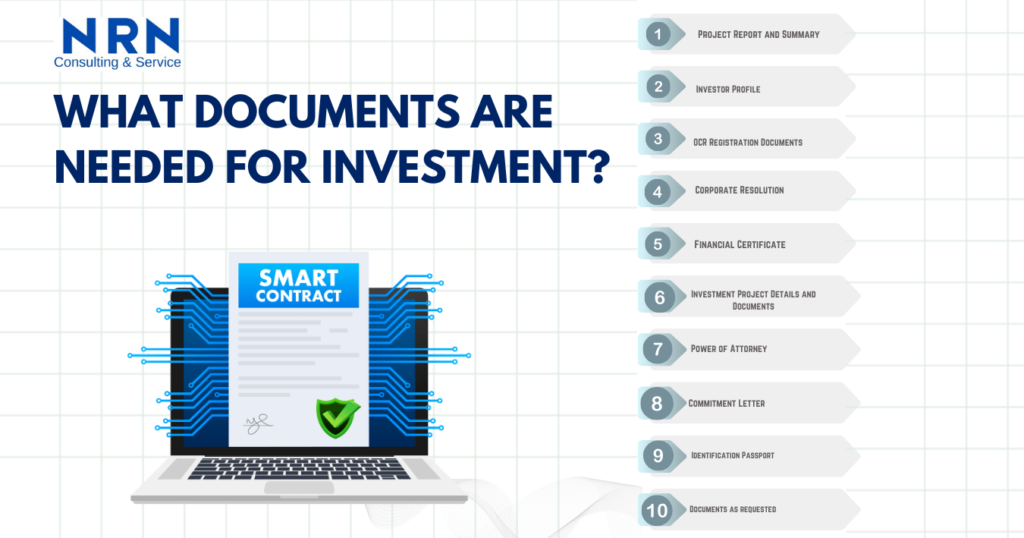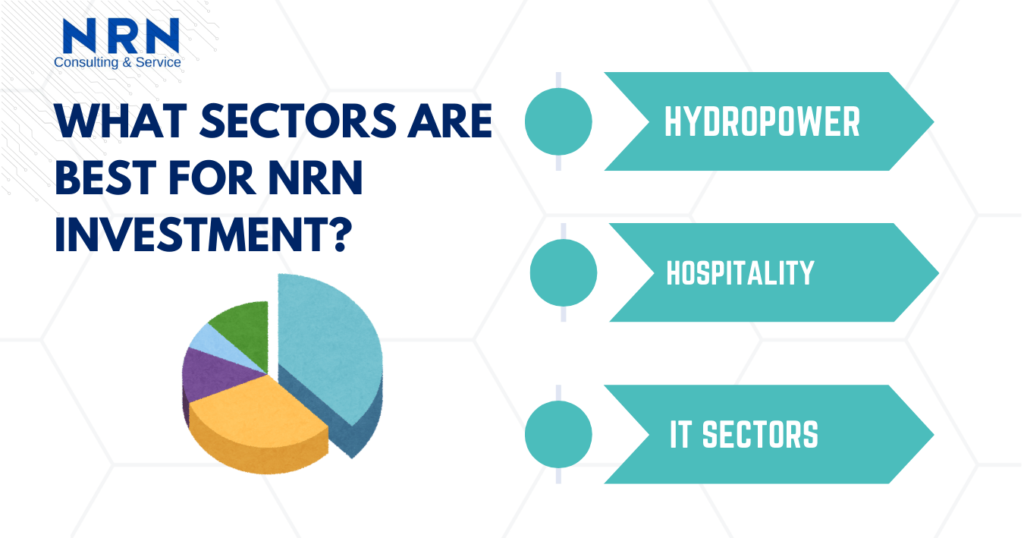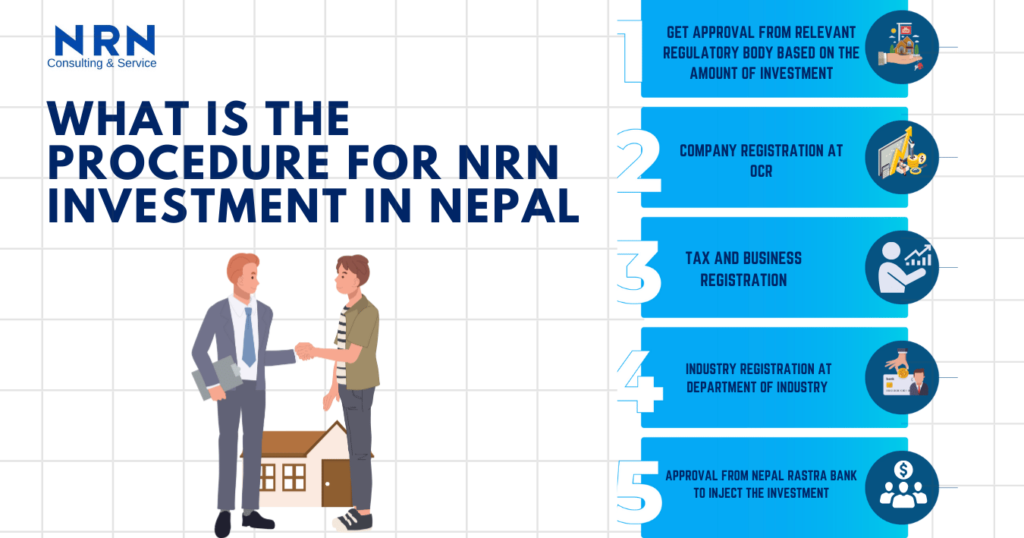How can NRN Invest in Nepal: An Investment Guide
NRN Services & Consulting provides exclusive Foreign Direct Investment Services for individuals interested for NRN Investment in Nepal. This Articles provides complete detail on how can NRN Invest in Nepal including Procedure, Documents, requirements, Time, and more.
Can NRNs invest in Nepal?

Yes, Non-Resident Nepalis (NRNs) can invest in Nepal in various sectors such as Infrastructure, Tourism, Hospitality, Manufacturing, and Agriculture. NRNs benefit from various incentives, including tax exemptions and repatriation of profits.
They can invest individually or through joint ventures with local partners, and they are allowed to repatriate their earnings. NRNs are categorized as a Foreign Investor in the Foreign Investment and Technology Transfer Act, 2019.
What investment opportunities are available for NRNs?
The Investment Opportunities available are as follows:
- Purchasing shares in foreign currencies
- Reinvesting profits gained from foreign currency or equity
- Financing through leasing
- Investing in a venture capital fund
- Acquiring listed stocks via the secondary securities market
- Acquiring shares or assets in a Nepali company
- Transferring technology (licensing foreign intellectual property, franchising, management, technical, and marketing services)
- Investing by establishing and expanding industries in Nepal
NRNs have a wide range of investment opportunities in Nepal. They can invest in sectors like hydropower, tourism, and information technology. The government has also opened up opportunities in education, healthcare, and manufacturing.
What is the Procedure for NRN Investment in Nepal?

Step 1: Get Approval from Relevant Regulatory Body based on the Amount of Investment
Step 2: Company Registration at OCR
Step 3: Tax and Business Registration
Step 4: Industry Registration at Department of Industry
Step 5: Approval from Nepal Rastra Bank to Inject the Investment
Step 1: Get Approval from Relevant Regulatory Body based on the Amount of Investment
A Non-Resident Nepali, while injecting Foreign Investment is treated as a Foreign Investor and must obtain approval from the appropriate regulatory body based on the Investment Amount and Sector, either the Department of Industry or the Investment Board of Nepal.
Step 2: Company Registration at OCR
Once regulatory approval is obtained, the next step is to register the company with the Office of the Company Registrar (OCR). The Memorandum of Association and Articles of Association must be submitted along with Required Documents in compliance with Companies Act, 2063.
Step 3: Tax and Business Registration
The business must register for tax purposes with the Inland Revenue Department (IRD) with a Permanent Account Number (PAN) and Value Added Tax (VAT) if applicable.
Step 4: Industry Registration at Department of Industry
The Business must also be registered with the Department of Industry (DOI) where the application must be submitted for the nature of the Industry, investment amount and other information. After the approval, the business receives an Industry Registration Certificate.
Step 5: Approval from Nepal Rastra Bank to Inject the Investment
The final step is obtaining approval from the Nepal Rastra Bank (NRB) to inject the investment funds into Nepal by managing compliance as per Nepal Rastra Bank Guidelines in adherence with Foreign Exchange Regulations. Finally, the NRN can legally transfer funds into Nepal.
What documents are needed for investment?

The Documents required for NRN Investment in Nepal are:
- Project Report and Summary
- Investor Profile
- OCR Registration Documents
- Corporate Resolution
- Financial Certificate
- Investment Project Details and Documents
- Power of Attorney
- Commitment Letter
- Identification Passport
- Documents as requested
Are there any restrictions on NRN investments?
Recently, the Minimum Investment amount required from a NRN Investment in Nepal was removed and therefore a Non-Resident Nepali can invest the desired amount of choice. However, certain industries cannot be invested upon by such individuals.
There are some restrictions on NRN investment in Nepal. NRNs cannot invest in certain sectors reserved for Nepalese citizens, such as defense and security industries. Investments in real estate are also subject to limitations, including restrictions on land ownership and usage. Additionally, NRNs must comply with foreign exchange regulations, which govern the repatriation of profits and investment funds.
How can NRN Invest in Nepal and Nepali Real Estate?
Non-Resident Nepali can purchase lands in Nepal which has been discussed in another Article. Generally, the requirement is:
(a) In the Kathmandu Valley, foreign citizens of Nepali origin are allowed to purchase land up to a maximum area of 2 Ropani.
(b) Within the municipalities of the Terai district, these individuals are permitted to acquire land, with the maximum allowable area set at 8 Kattha.
(c) In municipalities other than those specified in (a) and (b), foreign citizens of Nepali origin can purchase land, provided the area does not exceed 4 Ropani.
(d) In village development committees of the Terai district, excluding those mentioned in (b), these individuals have the opportunity to purchase land up to One Bigaha.
(e) In areas not specified foreign citizens of Nepali origin are eligible to acquire land up to a maximum area of 10 Ropani.
The Foreign Investment and Technology Transfer Act 2019 has barred any form of investment in the Real Estate Sector.
Can NRNs invest in the Nepali stock market?
Yes, Non-Resident Nepali can invest in the Stock Market and the Companies of Nepal directly by purchasing shares or by purchasing shares through the Secondary Market. To do so, they must first obtain a Non-Resident Nepali (NRN) Identity Card. Next, they need to open a dematerialized (demat) account with a registered depository participant in Nepal. They must also open a bank account in Nepal to facilitate transactions. Once these accounts are set up, NRNs can buy and sell stocks listed on the Nepal Stock Exchange (NEPSE). They can participate in Initial Public Offerings (IPOs) and secondary market trading.
What are the benefits of investing in Nepal?

Investment in Nepal also benefits in terms of VISA, Growth and Repatriation. Investments can be made in Hydropower, Tourism, Agriculture and Information Technology. The government offers various incentives for investors, including tax exemptions, repatriation of profits, and simplified regulatory procedures.
Are there tax incentives for NRN investors?
Yes, individuals holding NRN Card are also provided Tax Exemptions in Nepal. The government provides various tax benefits to attract NRNs and foreign investments. NRNs can also benefit from reduced tax rates on repatriated profits and dividends.
How to start a business in Nepal?
Business can be started through its legalization, usually through the Office of Company Registrar (OCR) to obtain the registration Certificate. After that, the company must apply for a Permanent Account Number (PAN) from the Inland Revenue Department for tax purposes. Thereafter, necessary licenses and permits must be obtained from relevant authorities along with Social Security Fund Registration. The Business also requires Compliance with Nepali Laws and Regulations.
Can NRNs invest in agriculture?
The Agriculture Sector has been prevented from Foreign Investment by the Foreign Investment and Technology Transfer Act, 2019 (FITTA). In the following, investment isn’t allowed: Poultry Farming, Bee-Keeping, Fruits, Vegetables, Oil Seeds, Pulse Seeds, Fisheries, Milk Industry and other sectors of Primary Agriculture Production.
What is the time taken for foreign direct investment?
The Complete time taken to inject the Foreign Investment into Nepal, although depends on the complexity of the Investment, takes 3 to 5 Months for completion.
Are there any government schemes for NRNs?
Yes, the government has allowed for Non-Resident Nepali to invest any quantity into Nepal regardless of the Capital whereas the minimum Foreign Investment Amount was NPR 20 Million.
There are several government schemes for NRNs in Nepal. The government has established the Non-Resident Nepali (NRN) Act, which provides a legal framework for NRN involvement in Nepal’s development. NRNs can obtain the NRN Identity Card, which grants them certain privileges and rights, including the ability to own property and invest in various sectors. The government offers incentives such as tax exemptions, investment facilitation, and repatriation of profits for NRNs investing in Nepal.
Can NRNs invest in Nepali startups?
Non-Resident Nepali can invest in Startups of the Relevant Sector directly or through Venture Capital Funds through Foreign Investment route.
Are there any Institutions for NRN Investors?
NRN Services & Consulting is the leading Complete Service Provider for Non-Resident Nepali and such investors. The Firm provides Property, Investment, Drafting, Documentation and other multitude of services to Non-Resident Nepali.
How to repatriate investment profits?
First, ensure your investment complies with Nepalese laws and regulations. Open a foreign currency account with a licensed bank in Nepal to facilitate the repatriation process. Maintain accurate financial records and obtain an audit report verifying the profits. Submit an application to the Department of Industry (DOI) or Nepal Rastra Bank (NRB), along with required documents such as the audit report, tax clearance certificate, and proof of investment. Once approved, the bank will process the transfer of funds to your foreign account.
Can NRNs invest in Nepali bonds?
Yes, NRNs can invest in Nepali bonds. The government allows NRNs to purchase both government and corporate bonds. To invest, NRNs need to obtain a Non-Resident Nepali (NRN) Identity Card. They must open an investment account with a licensed bank or financial institution in Nepal. Government bonds, such as Nepal Savings Bonds and Treasury Bills, are available through the Nepal Rastra Bank. Corporate bonds can be purchased from various Nepalese companies seeking to raise capital.
What sectors are best for NRN investment?
Hydropower, Hospitality and IT Sector are the fastest growing and most ROI providing Sectors of Investment for Non-Resident Nepali.

FAQs
Can NRNs invest in Nepal?
Yes, NRNs can invest in various sectors like infrastructure, tourism, hospitality, manufacturing, and agriculture.
What investment opportunities are available for NRNs?
NRNs can invest in hydropower, tourism, information technology, education, healthcare, and manufacturing sectors.
What is the procedure for NRN investment in Nepal?
Step 1: Obtain Approval from DOI or IBN
Step 2: Company Registration
Step 3: Tax Registration
Step 4: DOI Registration
Step 4: Approval from Nepal Rastra Bank
What documents are needed forApproval of NRN investment?
The Documents required for NRN Investment in Nepal: project report, investor profile, OCR registration, corporate resolution, financial certificate, investment details, and ID.
What are the benefits of investing in Nepal?
Benefits include tax exemptions, repatriation of profits, and investment opportunities in high-growth sectors.
How to start a business in Nepal as a NRN?
Register with the Office of Company Registrar, obtain a PAN from the Inland Revenue Department, and comply with legal requirements.
Are there any restrictions on NRN investments?
NRNs can't invest in certain sectors like defense, security, and some real estate due to legal restrictions.
Can NRNs invest in the Nepali stock market?
Yes, NRNs can invest in the stock market by obtaining an NRN Identity Card and opening a demat account.
